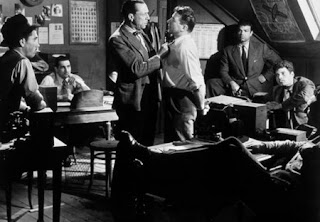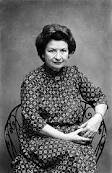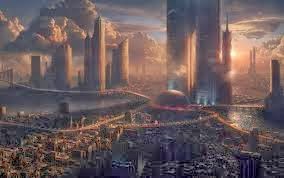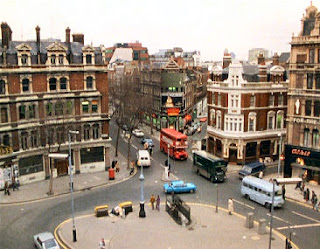And it's not even the end of the world
Depressives always know that it can get worse, there's no need to tell us "Smile! It could be worse!" We know(!) Perhaps that's why this depressive has always had a bit of a thing for apocalyptic fiction.
You'd think it could only get better - so the world you loved has been wiped aside in a nuclear holocaust, or ravaged by man-eating plants - what more could go wrong? Well, man of course could go wrong. Why start again with a brighter, shinier version of humanity? Let's just pick out all the dross and let them inherit the earth. The really sad thing about this is that it feels all too real to me. I would suspect that if the end of the world was nigh, the spoils of the post-apocalyptic world probably would go to the nastiest end of society, not the tree-huggers.
One of the scariest pieces of apocalyptic fiction I've ever read is, without a doubt, Margaret Atwood's The handmaid's tale. Set in a part of America which is vaguely recognisable, but very different, the conservative right has taken over (after gunning down the whole of Congress) and imposed a theocracy. Frequent nuclear accidents and other mishaps have led to widespread sterility among both men and women, while those women who are still fertile are carefully controlled. The "handmaids" may harbour in their wombs the prospect of having children, but for all that, this is a barren sterile existence that they lead; sans love, sans joy, sans humanity, sans even books (reading might give women ideas).
The story is told from two perspectives. The main thrust of the narrative is told by Offred (i.e. belonging to Fred), an anonymous handmaid separated from her husband (as a second wife their marriage has been made illegal) and daughter. There is also a brief epilogue in which the tale is placed in context at an academic convention some years later.
Offred's tale is, without doubt, horrible, and yet, it seems so futuristic - that couldn't happen here, now, could it? Of course not. And yet....after reading the convention section you realise how much of Atwood's scary futuristic tale is indeed happening here and now.
"Particicutions" in which everyone joins in to execute an offender happened regularly in Afghanistan under the Taliban - for all I know, they may be part of everyday life elsewhere too. Women's rights are severely curtailed in many countries throughout the world - whether it's their sexual rights, their equal rights to an education, or their rights to have a level of control over their own bodies. Much of what Atwood writes is not set in a scary future state, but in reality is in an equally scary here and now - where women can be stoned to death just for the suspicion of having sex with the wrong man, and where they remain in ignorance because of a decision - made by a man - that they don't merit education.
It's a profoundly depressing read, but worth reading. Perhaps the single most important point Atwood puts across here is that rights, even seemingly simple ones, are worth fighting for. The situation in The handmaid's tale was partly brought about by events beyond most peoples' control, but the final situation was, in a large part due to no-one getting up and saying "No, this must be stopped". In this Atwood's world copies every totalitarian state that has ever existed.
There may or may not be a happy ending for the Offred of this tale, for many women worldwide parts of The handmaid's tale is their everyday reality. It's a salutary chilling tale. I've never really rated Margaret Atwood before, but I suspect that actually she's quite brilliant...
You'd think it could only get better - so the world you loved has been wiped aside in a nuclear holocaust, or ravaged by man-eating plants - what more could go wrong? Well, man of course could go wrong. Why start again with a brighter, shinier version of humanity? Let's just pick out all the dross and let them inherit the earth. The really sad thing about this is that it feels all too real to me. I would suspect that if the end of the world was nigh, the spoils of the post-apocalyptic world probably would go to the nastiest end of society, not the tree-huggers.
One of the scariest pieces of apocalyptic fiction I've ever read is, without a doubt, Margaret Atwood's The handmaid's tale. Set in a part of America which is vaguely recognisable, but very different, the conservative right has taken over (after gunning down the whole of Congress) and imposed a theocracy. Frequent nuclear accidents and other mishaps have led to widespread sterility among both men and women, while those women who are still fertile are carefully controlled. The "handmaids" may harbour in their wombs the prospect of having children, but for all that, this is a barren sterile existence that they lead; sans love, sans joy, sans humanity, sans even books (reading might give women ideas).
The story is told from two perspectives. The main thrust of the narrative is told by Offred (i.e. belonging to Fred), an anonymous handmaid separated from her husband (as a second wife their marriage has been made illegal) and daughter. There is also a brief epilogue in which the tale is placed in context at an academic convention some years later.
Offred's tale is, without doubt, horrible, and yet, it seems so futuristic - that couldn't happen here, now, could it? Of course not. And yet....after reading the convention section you realise how much of Atwood's scary futuristic tale is indeed happening here and now.
"Particicutions" in which everyone joins in to execute an offender happened regularly in Afghanistan under the Taliban - for all I know, they may be part of everyday life elsewhere too. Women's rights are severely curtailed in many countries throughout the world - whether it's their sexual rights, their equal rights to an education, or their rights to have a level of control over their own bodies. Much of what Atwood writes is not set in a scary future state, but in reality is in an equally scary here and now - where women can be stoned to death just for the suspicion of having sex with the wrong man, and where they remain in ignorance because of a decision - made by a man - that they don't merit education.
It's a profoundly depressing read, but worth reading. Perhaps the single most important point Atwood puts across here is that rights, even seemingly simple ones, are worth fighting for. The situation in The handmaid's tale was partly brought about by events beyond most peoples' control, but the final situation was, in a large part due to no-one getting up and saying "No, this must be stopped". In this Atwood's world copies every totalitarian state that has ever existed.
There may or may not be a happy ending for the Offred of this tale, for many women worldwide parts of The handmaid's tale is their everyday reality. It's a salutary chilling tale. I've never really rated Margaret Atwood before, but I suspect that actually she's quite brilliant...











Comments